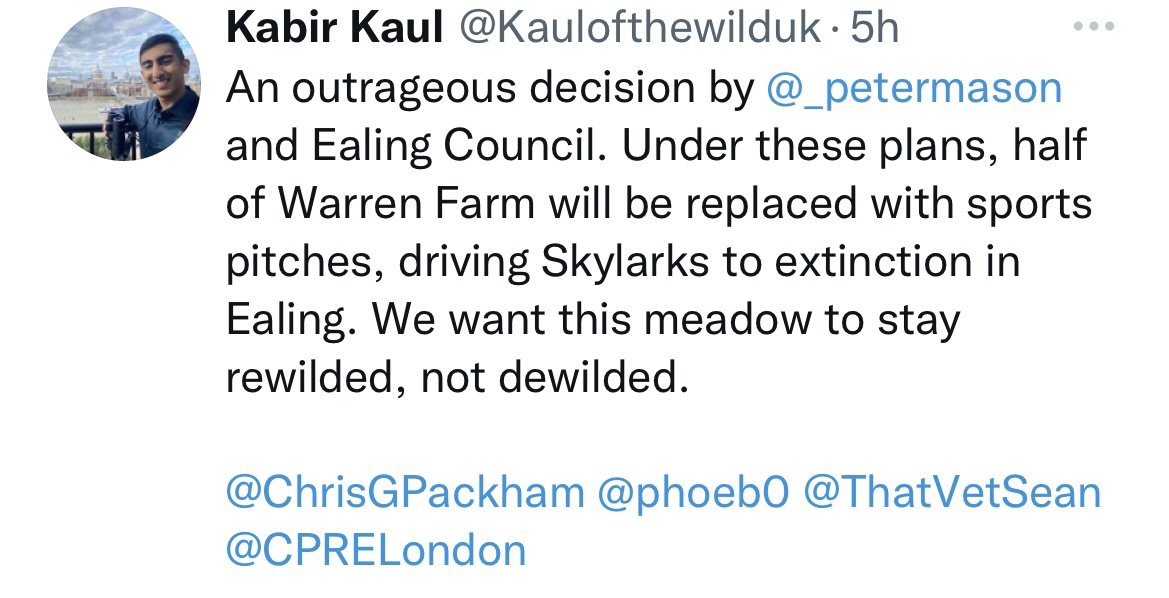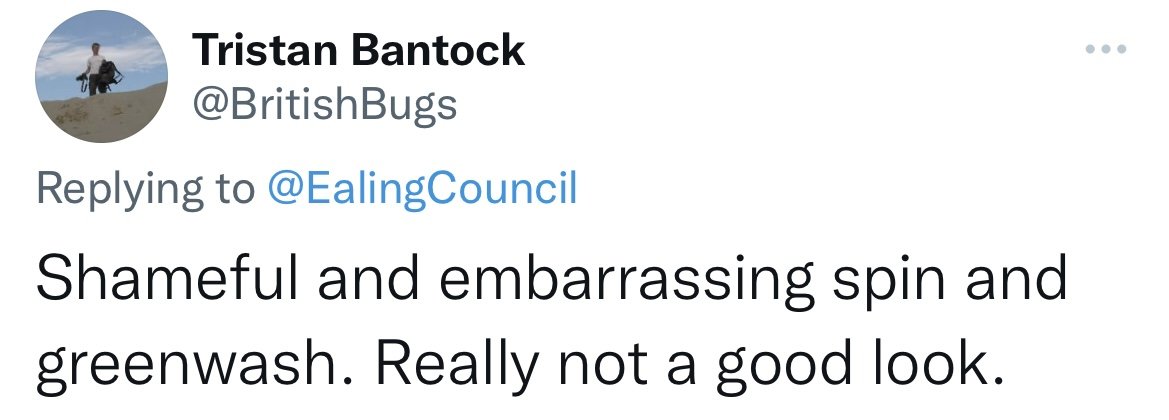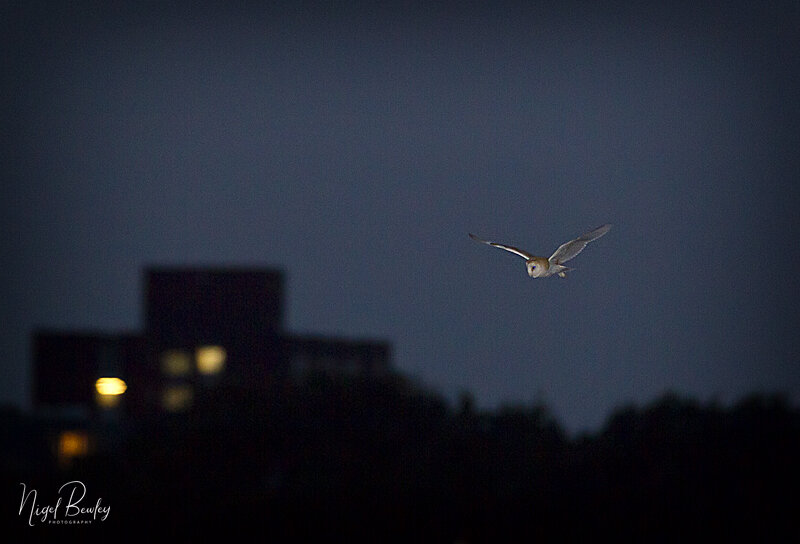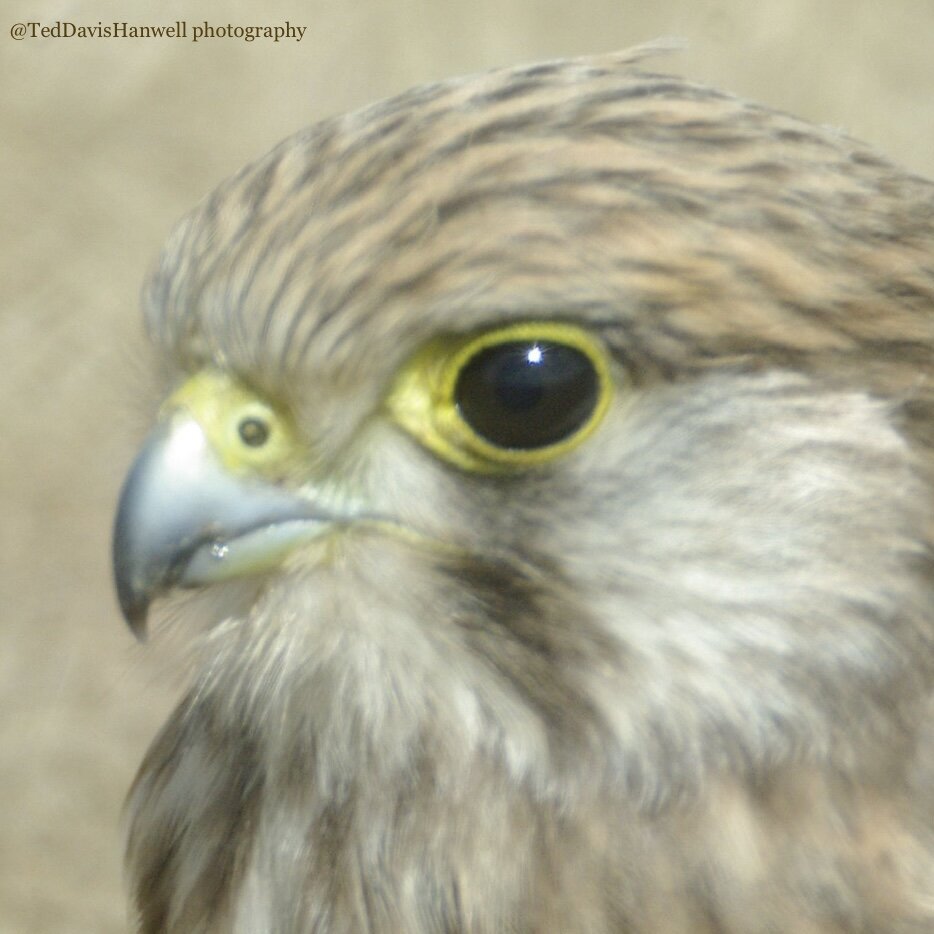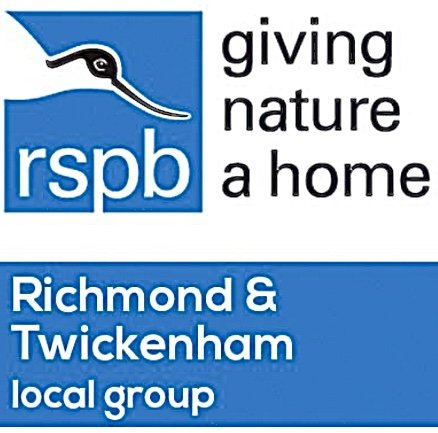Social Media Support
Supporter Statements
BRCS’ Vision for Warren Farm Nature Reserve and surrounding BRP Meadows - please click here to read the vision in full.
“Surveying and monitoring by our experts, since Warren Farm was abandoned in 2013, has provided overwhelming evidence showing its significance for nature conservation. This acid and neutral grassland habitat supports rare plants, scarce and endangered wildlife. Brent River & Canal Society (BRCS) are seeking the designation of Warren Farm Nature Reserve and the surrounding Brent River Park Meadows as a statutory Local Nature Reserve. We call on Ealing Council, Labour leader Peter Mason and the Mayor of London to work together to adopt our vision.”
“I am very proud to be part of the campaign to protect this magnificent ecological jewel in Ealing. Warren Farm is home to such a wide range of biodiversity, including several red-listed species, and we cannot afford to let the borough’s Skylarks vanish. With the designation of a Local Nature Reserve, more people can become connected to the site, and develop a passion for the urban wildlife on their doorstep. This will help us to emphasise how important Warren Farm is in the surrounding Brent River Park, and indeed in West London. Please sign this petition to help protect Warren Farm Nature Reserve and surrounding BRP Meadows, and give its fantastic wildlife a voice.”
“The Local Nature Reserve vision set out by the Brent River & Canal Society, supported by Warren Farm Nature Reserve Group, is an important step on the path to enhancing Ealing’s natural environment heritage and a valuable outdoor community resource. I believe Ealing Borough Council has an important opportunity to secure this heritage as well as helping the borough achieve important goals in response to the global challenge of climate change. It is well-known that mature woodlands are important carbon sinks, the same is also true of established grasslands. Sadly, many of London’s grasslands are increasingly under threat and their loss should be avoided.
Prior to Warren Farm being vacated by Ealing Borough Council, much of the site was dominated by what is described as ‘amenity grassland’. Amenity grassland is often characterised as heavily mown grass that has very few plant species and is of limited ecological value. However, amenity grasslands can be more diverse and ecologically valuable than assumed. Some forms of amenity grasslands originate from pre-existing turf or the turf have been sourced from grasslands elsewhere. The turf is then mown heavily to achieve the desired amenity requirements of sports pitches or parkland lawns. Heavy mowing over a long period of time reduces the original plant diversity (many grassland plants cannot cope with heavy mowing) but very often some species persist in either a vegetative state or as dormant seed in the soil (the ‘seed bank’). After approximately 5 years of reduced mowing, the grasslands at Warren farm are recovering. Species that have persisted, often unobserved, in the turf are now reappearing and are likely to become more abundant.
Recent surveys by I and other botanists have identified many plant species growing in the grassland. These plants are of immense importance for pollinators and other invertebrates; these in turn are a valuable food resource for the many vertebrates occupying or visiting the site. It is also important to acknowledge the importance of plants in their own right. The site supports a diverse grassland plant community, many of these species are regarded as common in the United Kingdom (the UK and England Vascular Plant Red Lists describes them as ‘Least Concern’). However, due to habitat loss and pollution, many of these nationally common plants are increasingly uncommon or rare in Greater London. Of these ‘common’ plants, botanists have identified 3 plant species that are now very rare in Greater London (especially north of the River Thames) and are vulnerable to extinction in the region. Another two species found at Warren Farm are listed as ‘Near Threatened’ on the England Vascular Plant Red List; this designation means that these plants are close to being considered at risk of extinction in England. Throughout Greater London, there are only 4 known sites for one of these species – every one of these is important to its survival. We have also identified two species from the site that is described as either ‘Vulnerable’ or ‘Endangered’ on the UK and England Vascular Plant Red Lists. Being ‘Endangered’ means that this plant is ‘considered to be facing a very high risk of extinction in the wild’ in the UK, whereas ‘Vulnerable’ indicates the risk is ‘high’ (source: https://portals.iucn.org/library/sites/library/files/documents/RL-2001-001-2nd.pdf). For these vulnerable or endangered plants, every population is of the highest value and securing the future of these populations is essential in ensuring the continued survival of these species in the UK.”
“It was clearly evident from our observations taken in July 2019 that Barn Owls were hunting for food over the grassland at Warren Farm Nature Reserve. It was highly probable that Barn Owls were nesting somewhere on the site or on nearby adjacent land and will have had dependent young at the time. Barn Owls are primarily a species that inhabit open countryside and are rarely, if ever, found in urban environments. That these birds have been evidenced living at Warren Farm in the centre of London is both special and unique. The ecological importance of Warren Farm Nature Reserve and surrounding Brent River Park Meadows need to be acknowledged, with measures put in place that not only protect but indeed enhance the high value of these greenspaces for nature and the local community. Designating these rich urban wildlife sites with statutory Local Nature Reserve status will be a welcome and much needed step towards safeguarding biodiversity.”
“The experience of the lockdowns of 2020 has shown exactly how much the public value access to open spaces and nature nearby. This is particularly true of urban and suburban areas where green areas are at a premium. It is therefore paramount that we protect and enhance what we have already. Sadly, these are the very places that are the most threatened and where we must preserve for future generations. One particular suburban gem is Warren Farm in the London Borough of Ealing, a rare example of an urban acid grassland covering 61 acres but sadly perennially threatened by development.
It is home to scarce and threatened wildlife such as the iconic Skylark. Listening to their joyous song flights lifts the hearts of most people fortunate enough to hear them. There are so many other species that make their home among the meadows and ancients oaks. They need permanent protection.
That is why I am joining those calling for this precious location to be designated as a Local Nature Reserve. If it is lost, it is gone forever. ”
“There were many reasons why I nominated Warren Farm Nature Reserve for the 2019 Much Loved Park Award. I was blown away by its natural beauty and its fast growing numbers of species records, both common and endangered, along with the value of its acid grassland. People all around continue to use this park for walking, running, photography, model plane flying, bird spotting and more - at a time when it’s abundantly clear that our mental health is benefited when we spend time in nature. I could never have dreamt the public vote would be as high as it was, and I was delighted that we would be only one of four parks in the whole of london to receive the award. I would love to see this Nature Reserve fully protected so that it can continue to benefit our environment, our children for all the generations to come.”
“Warren Farm is an incredibly valuable site that offers ideal habitat for a variety of species of flora and fauna some of which are red and amber listed, so are of conservation priority. We are in a climate emergency, populations of animals, birds and fish have shrunk by 60% in four decades. We have a real opportunity here to make a difference and save an area (larger than St James’s Park!) for our wildlife, for the people that visit and for the fresh air that we all breath. Save and protect Warren Farm Nature Reserve.”
“We have a membership of nearly 500 people, mainly Ealing residents, and regularly walk as a group and individually in these precious urban meadows with their incredible species-rich diversity. In recent years the rewilding of these green spaces so close to densely populated areas has enabled residents to observe and appreciate many rare and endangered species of birds, insects and plants while out for their daily exercise. Their habitats, however, are very fragile and vulnerable to destruction so it’s important that they are protected from developments which could threaten their survival. We believe that obtaining Local Nature Reserve status for Warren Farm Nature Reserve and its surrounding meadows would ensure the future of the important green spaces for the benefit of the health and enjoyment of local residents and provide significant environmental benefits.”
“Warren Farm Radio Flyers has been using this site as its regular venue since 1997, with only a brief interruption from 2014 – 2017, when plans to redevelop the site as a soccer academy threatened the club with closure. From the time that we were able to return to our base in 2017, we have been amazed at the way the naturally rewilded site had produced a proliferation of flora and fauna. The previously close-mown 61 acres had developed a life of its own, with plants of every conceivable variety appearing in what had previously been a sterile landscape. The other noticeable item was the number of different Butterflies, especially in the various plants surrounding our small take-off and landing area. The most noticeable feature has been the Skylarks, whose beautiful song can be heard throughout the season. They, like the other birds and animals on site, seem to take no notice of our flying activities. The only exception to this has been a Red Kite, which has appeared regularly. One of our members built a very realistic model of an Australian Red-Backed Sea Eagle. Whenever this was flown, the Red Kite would appear from a great distance away, and fly in close formation with the model for several minutes, providing an opportunity for another club member (a keen wildlife photographer) to take many close-up shots of the Red Kite. Even when we are not flying, some of our members take much pleasure in simply walking around the site, taking in the tranquil area, so peaceful that it is hard to realise that Warren Farm is in the middle of one of the most overdeveloped boroughs in London. To lose such a wonderful wildlife facility to redevelopment or sport would be a great shame, particularly as so much of our borough is being concreted over.”
“Warren Farm ticks all the boxes for being a Local Nature Reserve and is already making London National Park City greener, healthier and wilder. Let’s get the paperwork done.”
“As a local resident and founder of the London National Park City, I’m excited about the potential for Warren Farm and the surrounding meadows to become a Local Nature Reserve for the community, borough and city to be proud of. So close to Southall, Hanwell and Osterley, this site has extraordinary potential to benefit both people and wildlife. The site is already home to a diverse range of visiting and resident wildlife. All it needs now is some protection and investment.”
“London has just half the green space it needs for a population its size, and yet has so many green spaces which are being neglected, ignored, or at risk of being lost forever. CPRE London’s Ten New Parks Campaign aims to support local groups in getting some of these green spaces back into use by the local population. Warren Farm Nature Reserve, a large area of abandoned former playing fields and land, was at risk of being given away but now, in cooperation with the local charity the Brent River & Canal Society, this unique rewilded space does not have to be lost and can be a jewel for nature and physical activity for years to come as a Local Nature Reserve.”
Please click here to see the CPRE London #tennewparks campaign, and to show your support: https://www.cprelondon.org.uk/news/lets-create-ten-major-new-parks-for-london-now/
“Ealing Friends of the Earth strongly supports the campaign to make Warren Farm a local nature reserve. Doing so will enable public access, protect and enhance the habitats and wildlife of this important part of the Brent River Park, and incur negligible costs. It would support the aims of Ealing Council’s Climate and Ecological Emergency Strategy, which seeks to “Enhance biodiversity, expand natural (green) infrastructure services and improve operational CO2 emissions”. It would also help to reduce flood risk, minimise air pollution and sequester carbon.”
“The huge growth in LAGER Can’s membership, from 375 in June 2020 to over 1,800 in June 2021 and growing, started with a series of clean-up events at Warren Farm last Summer. Working with our partners we helped to transform this site, already teeming with wonderful wildlife, into a safer and even more beautiful community space - a jewel in Ealing’s crown. This transformation inspired and incentivised our growing membership to carry our similar transformational work at derelict sites all over the Borough, to the huge benefit of wildlife and residents alike. We strongly support the initiative to gain Local Nature Reserve status for Warren Farm.”
“Warren Farm has been a wonderful example of urban rewilding over the past several years as management of the site has been relaxed and we’ve seen the glorious return of nature in staggering abundance. The legal battles to protect the site from development have afforded nature time to transform it into an incredibly biodiverse meadow habitat. One that now supports a host of species that may not have appeared here otherwise.
The Skylarks in particular are a jewel in Ealing’s crown, and those at Warren Farm represent possibly the closest breeding population to central London. This red listed bird is just one example of native UK wildlife in massive decline and clinging on in this time of climate crisis and biodiversity loss.
Time and attitudes have moved on since the original proposals were drawn up for developing the site and the state of nature is in a pretty dire place. Which is why it’s a perfect opportunity for Ealing Council to reassess the future of Warren Farm.
Our vision at Ealing Wildlife Group aligns very closely with that of Brent River and Canal Society. We strongly advocate that Local Nature Reserve (LNR) status is pursued and implemented. Not only is it important for our community to have this vital green space protected for the future, but designating it with LNR status will help it continue to capture carbon, protect biodiversity and enhance the greening of our borough. These are all aims outlined in the Council’s very own Climate and Ecological Emergency Strategy.
The updated Ealing Biodiversity Action Plan (BAP) soon to be released also outlines the need for protection of important species and their habitats. Skylarks, Barn Owls, bats, pollinators, reptiles and amphibians are prioritised, all of which rely on Warren Farm and its surroundings.
We recognise the need for sports facilities in the borough, but to damage this amazing rewilded gem of a place considering how far it has come and how much life now depends on it would be a shameful pity. Once we lose this precious space and the wildlife it contains, we lose it for good. I would urge the new leaders of Ealing Council to find a solution and space for sports facilities elsewhere, and protect Warren farm as a Local Nature Reserve while they have the opportunity to start from a fresh slate. Ealing Wildlife Group’s ethos of ‘Community, Collaboration, Conservation’ means we are there to fully support and help with this vision.”
“Warren Farm is an important grassland and brownfield site in the Brent Valley and the Hertfordshire and Middlesex Branch of the national conservation charity Butterfly Conservation support the proposal for the land to be designated as a Nature Reserve.
Since we were invited to look at the site in 2018 there have been records of 17 butterfly species, including the regionally declining Essex and Small Skippers and the not commonly seen Purple Hairstreak. Moth recording has been limited to day flying species and those that create mines in plant leaves but two daytime visits have found 12 species and there will be certainly be many more to be found. There are undoubtedly other species that will be recorded here.
It is significant in being in the Brent Valley as river valleys are often the vector for the spread of butterfly species. We have evidence that the rare but expanding Brown hairstreak is spreading through west London this way and, although it has not been recorded here, it is potentially a site that could be a host to it.
Grassland such as Warren Farm is a valuable habitat for many types of insect and the large expanse here makes it an important resource both for them and as a carbon sink near the heart of heavily built up London.”
“We as Hanwell And Norwood Green Orchard Trail (Hangot) fully support the initiative to get recognition for the wonderful space that is Warren Farm.
As a group of volunteers, we have planted many trees over the last 7 years. We maintain several small community orchards in the Hanwell Meadows and some other orchards along the Grand Union Canal. It is incredibly important to us that this whole area gets a protected status.
The designation as Local Nature Reserve would be a perfect way to achieve this protection. By connecting all the different areas in this way, all the green spaces will form one large, biodiversity-rich green space and wildlife corridor. It will help all groups involved in wildlife protection and the people using the space for recreation, to bundle their powers and work together to enhance and protect this amazing green space for years to come.”
“As an Ealing resident, I know that Warren Farm is an important green space, both for nature, and as a space for renewing local people’s physical and mental health. The mixture of habitats (grassland, brownfield, scrub, mature trees etc) support a variety of wildlife, including a crucially important breeding population of Skylarks (down to just 50 pairs in London), and other declining species such as Linnets and Kestrels. It is also important for seasonal visitors such as Stonechats, and as a refuelling point for migrants such as Wheatear and Whinchat.
Warren Farm is equally important as a place for local people to walk / dog walk / rest, and play. There is an increasingly large body of scientific research showing that regular access to green spaces is vital in creating and maintaining people’s physical and mental health. In the words of the African proverb ‘Health is made at home, hospitals are for repairs’. Accessible green spaces are also vital for children’s development and play, affording great scope for interaction and imagination, as well as promoting their independence.”
“Warren Farm is a very special place for wildlife. Members of our group regularly visit the site to see & hear the breeding Skylarks, such an important area for them as a quarter of London’s breeding Skylarks nest there. Add to that the Linnets & Kestrels that are both in decline & also nest there. We have seen Wheatears & Whinchats on their migration route stopping off at Warren Farm to refuel.
It is also an important area for the brown Argus butterfly too. It is an absolute travesty that Ealing Council are planning to redevelop Warren Farm which is such an important biodiverse area with various habitats. It’s also an important area for local people to walk, knowing that it’s been proven that accessible green spaces are so beneficial for people’s mental & physical Heath & well-being”
“We live in challenging and, in many respects, unprecedented times. Solutions to many of the challenges are beyond the reach of us as individuals. None of us can individually resolve the regional conflicts reported on news channels. In the short term we are powerless to affect the choices political representatives make with respect to the fight against crime, disease prevention, the cost of living crisis, and so on. None of us can, as individuals, impact the processes used by multilateral aid and lending agencies to distribute aid to the world’s poorest.
However, much closer to home, we as individuals and our local communities can work together in order to help preserve invaluable natural assets and protect their biodiversity. In the face of the climate and environmental emergencies we face the need to protect natural assets has never been more urgent. Warren Farm in West London is one such natural asset in need of protection. This beautiful urban meadow has been home to countless species of birds, insects and other creatures, some - such as its population of breeding skylarks - are considered endangered.
Natural assets are amongst the hardest to regenerate once lost, which is why their depletion must be resisted. Town planners, local councils and even governments often fail to appreciate the worth and contribution natural assets bring to their communities. It is difficult, for example, to place the joy and the beauty derived from seeing a kite soaring in the sky, and the contribution it makes to the ecological health of its domain, on a standard spreadsheet. This is precisely why any initiative designed to protect the ecological space has to start with redefining what and how we value what is around us. We owe it to ourselves, our communities and to future generations to do all we can to help preserves sites such Warren Farm. The natural oasis that is Warren Farm is simply too important to ignore.”
“Better Ealing Streets is an organisation campaigning for safe streets and clean air. This means fewer people traveling in private cars, and more people using active travel and public transport.
We believe Warren Farm is an unsuitable place for a sports hub. It is better for children to have playing fields close to their schools, to minimise the distance they have to travel. A giant central hub for sport in this location will inevitably lead to more private car use, and more air pollution”
“Parents for Future UK (PFF UK) is part of global parent network which campaigns for a rapid and immediate transition away from fossil fuels to ensure a just and liveable planet for our children and future generations. We campaign against new oil and gas licences, and for actions that mitigate and reverse the ill effects of the climate crisis at a local level. One of these is the promotion of rewilded green spaces as an important natural way urban areas can respond to the climate crisis. Rewilded land has the ability to remove millions of tonnes of carbon from the atmosphere and can protect people from the impacts of a changing climate, for example, against flooding and heatwaves. To this end, the West London group of PFF UK are vehemently opposed to the building of sports facilities and future development on Warren Farm for the following reasons:
1. The removal of a large proportion of the rewilded area directly adjacent to a main road will substantially reduce the carbon sequester capacity of the overall site;
2. The distance of the site from those to whom the sports facilities are intended to serve and the lack of active travel or public transport options on Windmill Lane will cause significant scope 3 carbon emissions to emanate from the site; and
3. The erosion of participatory democracy and resulting disenfranchisement of Southall residents to whom the facilities are intended to serve are evident in the council’s failure to adequately access and listen to their voices and concerns (with council members frequently stipulating that these residents have been less likely to contribute to the public consultation on Warren Farm).
As a result, we believe that the council’s claim that this plan is a ‘win-win’, that it represents the largest rewilding project attempted in London and that it contributes to their Climate and Ecological Emergency Strategy to be disingenuous and misleading. PFF West London, as local residents, concerned citizens and above all else parents who love their children and will move mountains to protect their future, demand that Ealing Council take seriously both these climate concerns and fears for democratic process in the borough, and be brave and bold in the face of climate breakdown”
More statements of support to come, so please keep checking back and follow us on social media for daily Warren Farm Nature Reserve updates and news.


